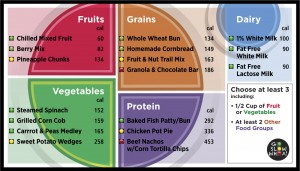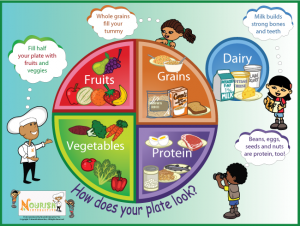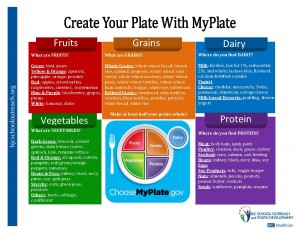As part of our Smarty Health Corner series with Carolinas HealthCare System, we chatted with Dr. Anna-Maria Temple, a pediatrician at Charlotte Pediatric Clinic. She’s a busy working mom and has AWESOME advice for nourishing your family. This is definitely one to Pin, bookmark, print, and share! Thanks, Dr. Temple!
What are the most important nutrients (and sources of food to get these nutrients) in a dinner?
The most important thing in the plate : something that grows from the ground – fruit or veggie. As a general rule, go for 1/2 cup of each or 1 cup of one. Lean proteins are needed (1 Tbsp per year of age). Complex carbs are also important such as quinoa, sweet potatoes, brown rice, quinoa pasta, couscous, whole wheat bread (1 tbsp per year of age). Water or milk for dinner. Juice does not fulfill any criteria unless you juice at home or make smoothies. Here are some helpful graphics.

Advice on handling picky eaters?
It is normal for toddlers to refuse to eat at some meals. The scientific explanation is that there are days that they don’t grow and they are not hungry, therefore they throw food on the floor. I call these “eating air days”. Then there are the days where tons of growing is going on and they eat everything, again.
Most parents reply back with “but they eat goldfish and crackers, so they must be hungry.” I generally reply back with “you will eat a doughnut after a good lunch because it looks good, not because you are starving.” So, just because they will stuff themselves with white starchy things or sugary things, is not a good indicator of hunger. Provide the meal as it was planned and if they chuck it, then they are excused from the table. Here are some of my other tips and thoughts on the subject:
– It’s Ok to send kids to bed hungry.
– It’s Ok to set time limits before you excuse them from the table. I usually suggest that your time frame to eat is the time you should set about 15-20min
– Never ever make another meal if the one prepared is not liked. Dinner is not a buffet or restaurant service
– It’s Ok to offer something you know they like with something that might be marginal or new. But never get up from the table to get them something else. That sets a bad precedent.
– Let kids help with grocery shopping and picking fruits and veggies. If you hate what they pick, give it back to the cashier. This can also be an exercise in color lessons, counting, boredom buster, alphabet game.
– Kids should help with meal prep – wash peppers, slice apples with apple slicer, peel carrots, arrange/toss salad, cut up veggies and fruits if developmentally appropriate. Many studies show that kids that help/handle food in the kitchen are less picky
– Let them play with food – smash sweet potatoes, make shapes out of red peppers, make snowman or caterpillars out of grape tomatoes, sprinkle cheese on broccoli like it’s snowing, etc.
– Create a family garden and grow some veggies and fruits. The more involved, the less picky they will be.
– Limit milk intake to 18-24 oz a day
– No sugared drinks – juice, soda, tea, Gatorade. Sugar will fill them up with empty calories. There are no vitamins of importance in juice.
– NO ELECTRONICS AT THE TABLE. Kids or parents. TV off. Many studies indicate that TV with meal time leads to less vegetable eating, eating past fullness which leads to obesity, and a family disconnect.
– Family meals 4 times a week as a minimum so they can watch you eat healthy. If you lead by example they will follow suit
– My Motto: Eat like you wish your children to eat.
There are many blogs available with “creative cooking” ideas for the picky eater. The premise behind this is to hide the healthy foods in smoothies, soups, sauces, etc .and the child doesn’t know that they are really drinking spinach in their “Shrek Smoothie”. What’s your take on this?
I am a big fan of hiding foods. Smoothies are one of my favorite ways to do it. There should be a combination of hidden and presented foods. Studies on picky eaters show that if kids routinely taste veggies or fruits without knowing, their taste buds will start welcoming those veggies/fruits. Veggies are generally more bitter then fruits so some kids’ taste buds need a little training.
If kids ask about things hidden in their food there should be an honest response.
Thank you so much to Dr. Temple for sharing your ideas with us.
![]()
Dr. Anna-Maria Temple
Charlotte Pediatric Clinic
Levine Children’s Hospital
Facebook
Instagram
Twitter






